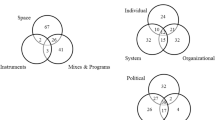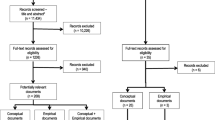Abstract
There is a need to bring methods to bear on public problems that are inclusive, analytic, and quick. This paper describes the efforts of three pairs of academics working from three different though complementary theoretical foundations and intervention backgrounds (ie ways of working) who set out together to meet this challenge. Each of the three pairs had conducted dozens of interventions that had been regarded as successful or very successful by the client groups in dealing with complex policy and strategic problems. One approach focused on leadership issues and stakeholders, another on negotiating competitive strategic intent with attention to stakeholder responses, and the third on analysis of feedback ramifications in developing policies. This paper describes the 10-year longitudinal research project designed to address the above challenge. The important outcomes are reported: the requisite elements of a general integrated approach and the enduring puzzles and tensions that arose from seeking to design a wide-ranging multi-method approach.
Similar content being viewed by others
References
Ackermann F and Eden C (1994). Issues in computer and non-computer supported GDSSs. Int J Decis Supp Syst 12: 381–390.
Ackermann F and Eden C (2001). Contrasting single user and networked group decision support systems for strategy making. Group Decis Negotiat 10: 47–66.
Ackermann F, Eden C and Williams T (1997). Modeling for litigation: Mixing qualitative and quantitative approaches. Interfaces 27: 48–65.
Ackermann F, Eden C and Brown I (2005a). The Practice of Making Strategy. Sage: London.
Ackermann F, Franco LA, Gallupe B and Parent M (2005b). GSS for multi-organizational collaboration: Reflections on process and content. Group Decis Negotiat 14: 307–331.
Andersen DF, Bryson JM, Richardson GP, Ackermann F, Eden C and Finn CB (2006). Integrating modes of systems thinking into strategic planning education and practice: The Thinking Person's Institute approach. J Publ Affairs Educ 12: 265–293.
Andersen DF and Richardson GP (1980). Toward a pedagogy of system dynamics. TIMS Stud Mngt Sci 14: 91–106.
Andersen DF and Richardson GP (1997). Scripts for group model building. Syst Dyn Rev 13: 107–130.
Andersen DF, Richardson GP and Vennix JAM (1997). Group model building: Adding more science to the craft. Syst Dyn Rev 13: 187–201.
Argyris C and Schon DA (1974). Theories in Practice. Jossey Bass: San Francisco.
Argyris C and Schon DA (1978). Organizational Learning: A Theory of Action Perspective. Addison-Wesley: Reading, MA.
Bardach EA (2004). Practical Guide for Policy Analysis, 2nd edn., Congressional Quarterly Press: Washington, DC.
Behn RD and Vaupel JW (1982). Quick Analysis for Busy Decision Makers. Basic Books: New York, NY.
Berger PL and Luckmann T (1966). The Social Construction of Reality. Doubleday: New York.
Blenkin GM and Kelly AV (2001). Action Research for Professional Development. Paul Chapman: London.
Bryson JM (2003). Strategic planning and management. In: Peters B.G. and Pierre J. (eds). Handbook of Public Administration. Sage: London, pp. 38–47.
Bryson JM (2004). Strategic Planning for Public and Nonprofit Organizations, 3rd edn.. Jossey-Bass: San Francisco.
Bryson JM and Finn CB (1995). Creating the future together: Developing and using shared strategy maps. In: Halachmi A. and Bouckaert G. (eds). The Enduring Challenges in Public Management. Jossey-Bass: San Francisco, pp. 247–280.
Bryson JM, Cunningham GL and Lokkesmoe KJ (2002). What to do when stakeholders matter: The case of problem formulation for the African American Men Project of Hennepin County, Minnesota. Public Admin Rev 62: 568–584.
Bryson JM, Ackermann F, Eden C and Finn C (2004). Visible Thinking: Unlocking Causal Mapping for Practical Business Results. Wiley: Chichester.
Checkland P and Holwell S (1998). Action research: Its nature and validity. Syst Pract 11: 9–21.
Crosby BC and Bryson JM (2005). Leadership for the Common Good, 2nd edn.. Jossey-Bass: San Francisco, CA.
Eden C (1990). The unfolding nature of group decision support. In: Eden C. and Radford J. (eds). Tackling Strategic Problems: The Role of Group Decision Support. Sage: London, pp. 48–52.
Eden C and Ackermann F (1998). Making Strategy: The Journey of Strategic Management. Sage: London.
Eden C and Ackermann F (2000). Mapping distinctive competencies: A systemic approach. J Opl Res Soc 51: 12–20.
Eden C and Ackermann F (2001a). Group decision and negotiation in strategy making. Group Decis Negotiat 10: 119–140.
Eden C and Ackermann F (2001b). A mapping framework for strategy making. In: Huff A. and Jenkins M. (eds). Mapping Strategy. Wiley: London, pp. 173–195.
Eden C and Huxham C (1996). Action research for the study of organizations. In: Clegg S., Hardy C. and Nord W. (eds). Handbook of Organization Studies. Sage: Beverly Hills, pp. 526–542.
Eden C, Jones S, Sims D and Smithin T (1981). The intersubjectivity of issues and issues of intersubjectivity. J Mngt Stud 18: 37–47.
Eisenhardt KM (1989). Building theories from case study research. Acad Mngt Rev 14: 532–550.
Finn C (1996). Utilizing stakeholder strategies for positive collaboration. In: Huxham C. (ed). Creating Collaborative Advantage. Sage: London, pp. 152–164.
Finn, C (1997). Stakeholder analysis. PhD thesis, University of Strathclyde: Glasgow, Scotland.
Forrester J (1969). Urban Dynamics. MIT Press: Cambridge, MA.
Holman P and Devane T (1999). The Change Handbook. Berrett-Koehler: San Francisco, CA.
Howick S, Ackermann F and Andersen D (2006). Linking event thinking with structural thinking: Methods to improve client value in projects. Syst Dyn Rev 22: 113–140.
Howick S, Eden C, Ackermann F and Williams T (2007). Building confidence in models for multiple audiences: The modelling cascade. Eur J Opl Res 186: 1068–1083.
Huxham C and Cropper S (1994). From many to one—and back: An exploration of some components of facilitation. Omega 22: 1–11.
Huxham C and Vangen S (2005). Managing to Collaborate. Routledge: London.
Janis IL (1972). Victims of Group Think. Houghton Mifflin: Boston.
Kim WC and Mauborgne RA (1995). A procedural justice model of strategic decision making. Org Sci 6: 44–61.
Kolb DA (1984). Experiential Learning. Prentice-Hall: Englewood Cliffs, NJ.
Milling PM (1989). The Design of Strategy Support Systems, Advances in Support Systems Research. I.A.S.: Windsor, Ontario.
Mingers J and Brocklesby J (1997). Multi-methodology: Towards a framework for mixing methodologies. Omega 25: 489–509.
Mitroff II and Featheringham TR (1974). On systemic problem solving and the error of the third kind. Behav Sci 19: 383–393.
Morecroft J (1984). Strategy support models. Strat Mngt J 5: 215–229.
Munro I and Mingers J (2002). The use of multimethodology in practice—Results of a survey of practioners. J Opl Res Soc 53: 369–378.
Pettigrew A (1977). Strategy formulation as a political process. Int Stud Mngt Org 7: 78–87.
Pettigrew A, Whittington R, Melin L, Sanchez-Runde, Van den Bosch, Ruitgrok and Numagami (2003). Innovative Forms of Organizing. Sage: London.
Phillips LD (1984). A theory of requisite decision models. Acta Psychol 56: 29–48.
Phillips R (2003). Stakeholder Theory and Organizational Ethics. Berrett-Koehler: San Francisco.
Richardson G (1991). Feedback Thought in Social Science and Systems Theory. University of Pennsylvania Press: Philadelphia.
Richardson G and Pugh III AL (1981). Introduction to System Dynamics Modeling. Productivity Press: Boston, MA.
Schweiger DM, Sandberg WR and Rechner PL (1989). Experiential effects of dialectical inquiry, devil's advocacy, and consensus approaches to strategic decision making. Acad Mngt J 32: 745–772.
Senge P (1992). The Fifth Discipline. Doubleday: New York.
Sterman JD (2000). Business Dynamics: Systems Thinking and Modeling for a Complex World. Irwin McGraw-Hill: Chicago.
Warren KD (2002). Competitive Strategy Dynamics. Wiley: Chichester.
Weimar D and Vining A (2004). Policy Analysis: Concepts and Practice, 4th edn.. Prentice-Hall: Englewood Cliffs, NJ.
Wildavsky A (1979). Speaking Truth to Power. Little, Brown: Boston, MA.
Wolstenholme EF and Coyle RG (1983). The development of system dynamics as a methodology for system description and qualitative analysis. J Opl Res Soc 34: 569–581.
Zagonel AA (2002). Model conceptualization in group model building: A review of the literature exploring the tension between representing reality and negotiating a social order. In: Davidson P.I., Mollona E., Diker V.G., Langer R.S. and Rowe J.I. (eds). Proceedings of the 20th International Conference of the System Dynamics Society. Palermo, Italy, The System Dynamics Society: Albany, NY.
Zagonel AA (2003). Using group model building to inform welfare reform policy-making in New York State: A critical look. In: Eherlein R.L., Diker V.G., Langer R.S. and Rowe J.I. (eds). Proceedings of the 21st International Conference of the System Dynamics Society. New York City, USA, The System Dynamics Society: Albany, NY.
Zagonel AA (2004). Developing an interpretive dialogue for group model building. In: Kennedy M., Winch G.W., Langer R.S., Rowe J.I. and Yanni J.M. (eds). 22nd International Conference of the System Dynamics Society. Oxford, England, The System Dynamics Society: Albany, NY.
Zahn EKO and Greschner J (1993). Model-based planning for strategic management: An integrated simulation and learning toolkit. In: Zepeda E. and Machuca J.A.D. (eds). International System Dynamics Conference. Cancun, Mexico, System Dynamics Society: Albany, NY.
Author information
Authors and Affiliations
Corresponding author
Additional information
Earlier versions of this paper were presented at the Group Decision and Negotiation Conference, Karlsruhe, Germany, 25–26 June 2006; the Sino-American Conference on Public Administration, Beijing, P. R. China, 8–9 June, 2006; and the Annual Conference of the International Public Management Research Association, Glasgow, Scotland, 10–12 April, 2006.
Rights and permissions
About this article
Cite this article
Eden, C., Ackermann, F., Bryson, J. et al. Integrating modes of policy analysis and strategic management practice: requisite elements and dilemmas. J Oper Res Soc 60, 2–13 (2009). https://doi.org/10.1057/palgrave.jors.2602575
Received:
Accepted:
Published:
Issue Date:
DOI: https://doi.org/10.1057/palgrave.jors.2602575




